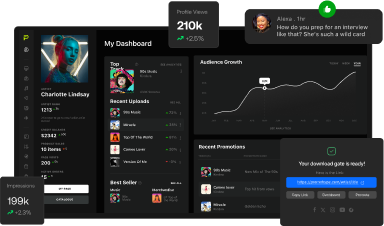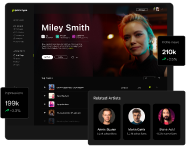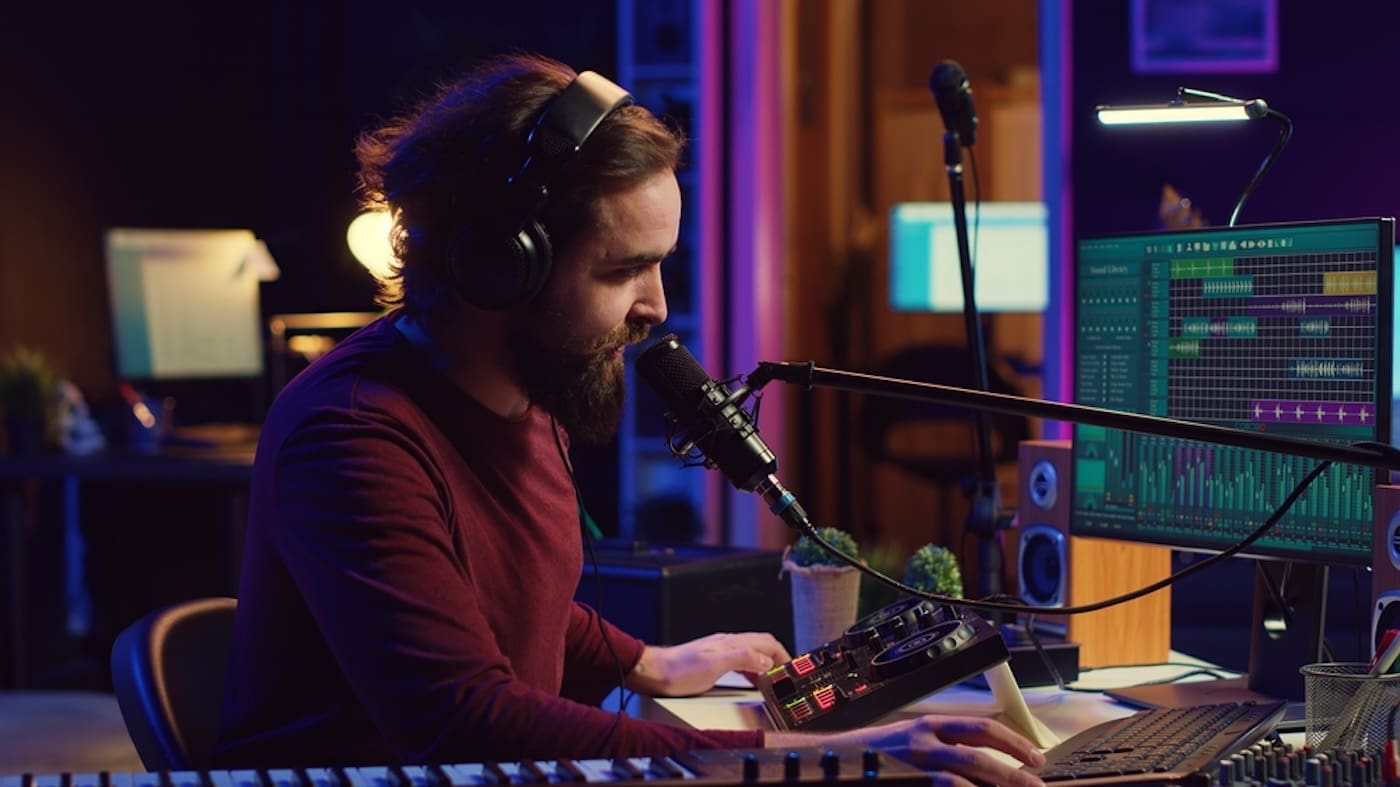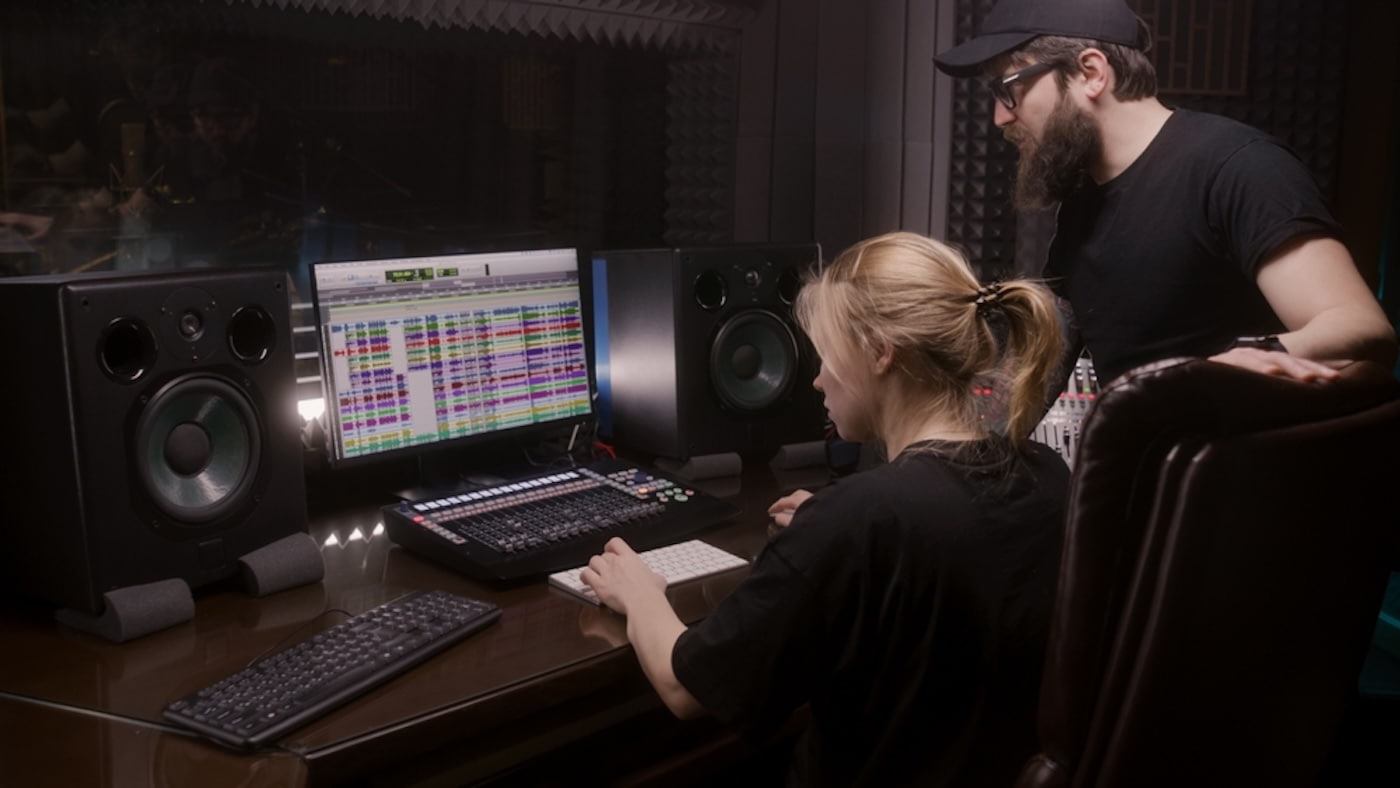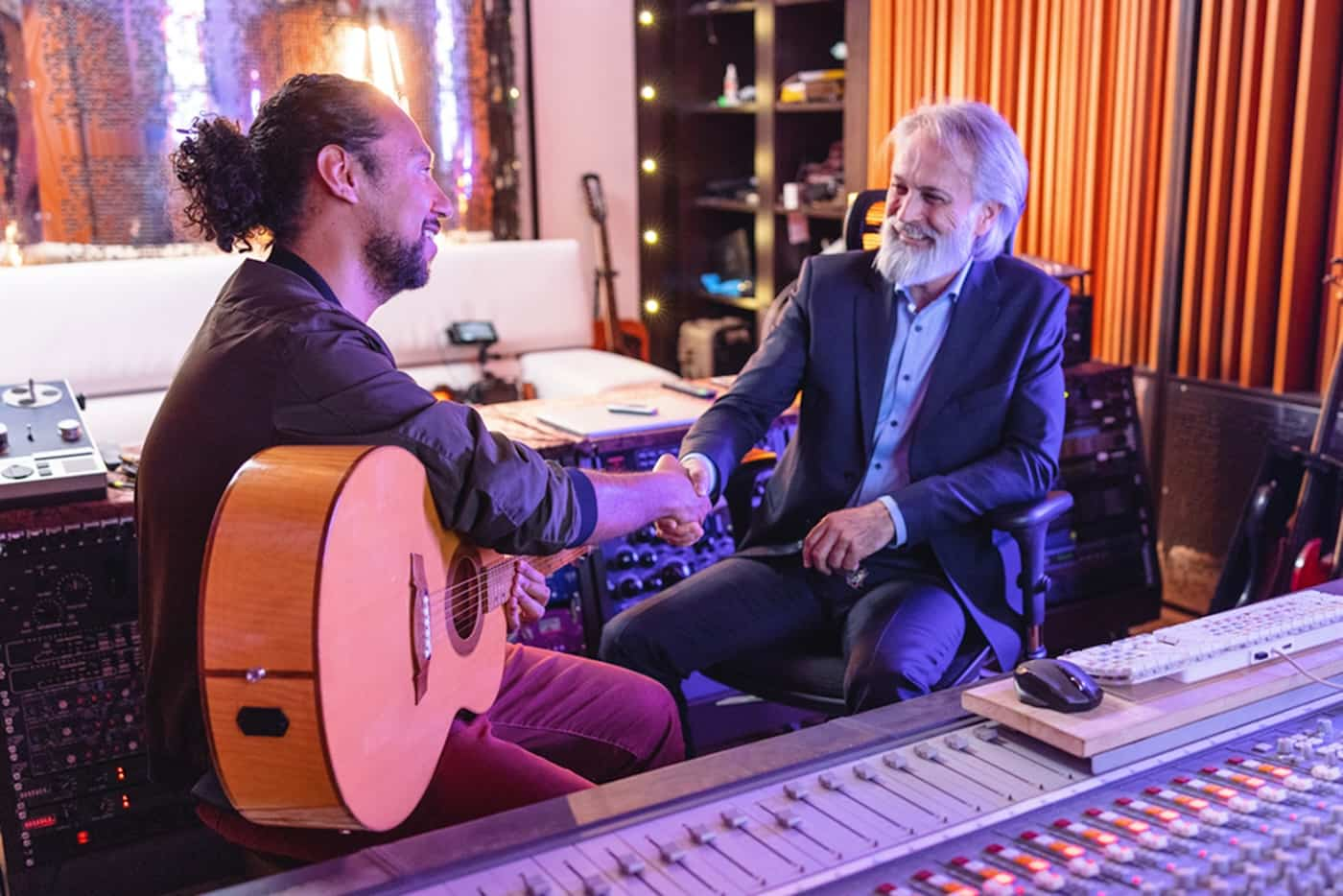
Are you ready to take your career to the next level and wondering how to get signed to a record label? Having an industry pro sign you up can have real advantages.
The path to a record deal is entirely different from even five years ago. What you know can often matter less than your Instagram following and streaming numbers. Most labels want artists with built-in fans and proof that you can sell music.
Our guide details how to position yourself for label attention, from fine-tuning your sound to negotiating contracts.
Get Early Access
To Promo Hype
What Is A Record Label?
Record labels exist to help musicians distribute, promote, and get paid for their music. They handle everything from identifying fresh talent to orchestrating album releases and marketing an artist’s music.
A record label employs various people who specialize in artist development. A&R scouts discover musicians while marketing professionals develop branding. Distribution experts get the music on streaming services, radio stations, and store shelves.
Labels today offer career advice, tour support, and social media strategies to help artists grow their careers. They also know precisely how to promote your music.
Record labels also supply the necessary financing and organizational structure that artists require. They provide money at a virtually impossible level for artists to reach independently.
Good labels provide environments where artists can focus entirely on creating great music while the music business professionals deal with the commercial side.
How Do Record Labels Work?
Labels invest in artists who make them money by selling recorded music, streaming, touring, and merchandise. Once the artist has spent the money, it serves as investment capital earned back when a song becomes a hit.
The relationship starts when A&R representatives find a strong performing act and offer them a contract. Once signed, the label pays for recording sessions, aids production, and directs promotional resources to maximize the artist’s commercial value.
Labels do the behind-the-scenes work of copyright management, royalty collection, and distribution partnerships that most artists and listeners never see. They have relationships with radio programmers, playlist curators, and the media that are vital in developing a buzz.
Once released, the label uses its distribution networks to ensure people can find the music on Spotify playlists and Apple Music. It may also press vinyl records for physical sales.
Promotion continues post-release, seeking playlist placements and submitting music to radio stations and media coverage. The label finances the process, including recording budgets, manufacturing, and marketing expenses.
Sign up to Promohype and share your music.
Major Labels Vs. Independent Labels
The music industry’s giants are big labels like Atlantic Records, Universal, Sony, and Warner. They have massive resources, global distribution, and enormous marketing budgets.
They could offer you the most exposure, but often want you to give up much creative control and a larger revenue cut. Major record labels also manage multiple artists; you may not get dedicated face-to-face time with them.
Smaller labels work with reduced budgets but often give artists better contract terms and creative control. They facilitate artist development, building in time for talent to develop its audience without the pressure to break big.
Independent record labels usually have better royalty rates, with shorter contract lengths. Artists with niche followings or a specific artistic vision might feel an indie label is more in tune with their goals.
Major labels offer worldwide reach, with teams in various countries collaborating on simultaneous global rollouts. They enjoy big budgets for costly music videos, extravagant promotions, and ad placements that most indie labels can’t afford.
What Can A Record Label Do For You In 2025?
Labels provide financial support for recording, touring, and video production that would otherwise be unavailable to most artists. The money allows you to make better content without accruing personal debt.
Teams of marketing professionals develop promotions for retail, digital, and other promotional media. Their relationship with playlists, radio programmers, and the press opens doors for them that would otherwise remain closed.
Labels provide invaluable experience with copyright protection, international distribution, and film and television licensing. Their advice keeps you from the most common legal traps and opens up lucrative opportunities.
Record labels nowadays have vast data-crunching operations to turn streaming and social media numbers into actionable marketing data. Their digital marketing teams know how to go viral on TikTok, promote playlists, and use digital marketing channels.
Physical distribution is another key benefit of a record label; you need manufacturing relationships and retail networks that most labels can maintain more efficiently than individuals.
Do Independent Artists Need Record Labels In 2025?
Record labels still offer significant benefits: industry connections, large-scale promotion, and access to resources that can open doors. For independent artists, though, the real question is: At what cost?
Signing with a label often means giving up some creative control, ownership rights, and flexibility over how and when your music is released.
That’s why more artists are turning to platforms like PromoHype to help them remain independent while still getting their music heard. Such platforms are tailored for indie artists and offer distribution without locking them into long-term contracts.
Ultimately, it depends on what kind of career you want and how much control you’re willing to trade for support.
Read more: A guide to the best music production software.
How To Get Signed To A Record Label: Step-By-Step
Getting a record deal requires strategy and effort. Our list is a practical 7-step guide that walks you through developing your unique voice and musical identity, ultimately leading you to connect and work with the right people.
Each step contributes to developing a package that appeals to label heads seeking to sign marketable talent.
Step 1: Define Your Sound
The first step to getting a record deal is building your unique sound. You don’t need to have attended the best music production school to sound great. Many labels look for artists who fit into established genres yet offer something new.
Develop your songwriting and music production skills and master your artistic vision. Create a clear brand that an A&R person can easily explain and argue for within their company.
Research current artists at target labels to understand what record companies appreciate. Use this research to help “place” your music without sacrificing your true style.
You’ll hear A&R people say, “We’re looking for something unique but accessible” when searching for new acts to sign. They’re looking for artists who feel fresh and familiar enough to connect with established audiences.
Step 2: Grow Your Fanbase Organically
Create a strong online presence on TikTok, Instagram Reels, and YouTube Shorts. Use short-form video content to highlight your personality and brand for people searching for new music.
Performing live, even small, local gigs, develops strong connections with audiences and the industry. Live shows hone your stagecraft and provide additional content for your press kit and streaming platforms.
Working with other artists opens up the potential for audience sharing and network growth. These relationships put your music before existing fan bases and demonstrate that you can collaborate with others.
Growing an email list through show sign-ups and website opt-ins is a promotional asset that record labels understand and value.
On your social media channels, focus on real fans rather than vanity metrics. Labels know that 500 loyal fans who buy your merch, go to your shows, and share your music are worth more than a passive 50,000 casual followers.
Connect with the Promo Hype community.
Step 3: Perfect Your Live Performance
Even with the increasing relevance of digital metrics, live performances are still crucial for attracting label attention. A&R people regularly attend shows, and some of the most successful artists were discovered at one of their small gigs.
Spend time rehearsing your playing and your ‘presence’ on stage. Practice what to say between the songs and how you look. Film yourself performing so you can see what needs work, and use the footage for social media and your promotional material.
Think about aspects of production such as lighting, backdrops, and synced visuals that complement your music rather than divert from it. These are professional touches that show commitment to the whole experience..
Step 4: Prepare A Professional Electronic Press Kit (EPK)
All aspiring musicians who want to join a record label need a good EPK. It should include a short artist bio, professional photos, music samples, live performance footage, and highlights from press coverage.
It should also mention key statistics that illustrate your growth, such as streaming stats, social interaction rate, live show ticket sales, and upcoming tour dates.
Having your EPK available online through a professional website is essential. Ensure that all components align with your overall brand while looking professional to make an outstanding first impression.
Be sure to highlight your story and some career high points in your artist biography. Professional photography that reflects your personality and style is crucial for press and promo material.
Create video content showcasing your live performance ability and good old-fashioned charisma. This step will also provide record labels with vital information about your marketability outside the studio.
Add concert videos, interview clips, and behind-the-scenes content that demonstrate different sides of your artistic persona.
Get Early Access
To Promo Hype
Step 5: Find And Target The Right Labels
Research potential labels to see which match your aesthetics, music, and goals. Check out their current label artists, track record, and marketing plans to see if they suit you.
Do they represent similar artists? Create customized pitches demonstrating exactly why you fit with the label.
Network selectively at music industry events, conferences, or showcases where labels attend to source talent. Research the personnel at your target labels, particularly the A&R representatives working with aspiring artists.
Step 6: Prepare Your Demos
Instead of bombarding labels with your entire music catalog, send them your best high-quality music. Hire a music producer if you can afford it, and ensure that your demos show your artistic side, yet have commercial potential.
Provide context with your submissions, e.g., accomplishments, upcoming gigs, etc, and a way to contact you. Start your submission with your ‘A’ material that will immediately capture the listener’s attention.
People in the music industry typically never make it past the first track if they’re not hooked immediately. Update your demo material as you evolve and have new content ready so you’re never unprepared for a surprise business opportunity.
Step 7: Be Ready for Industry Conversations
Learn the standard terminology of recording contracts, such as advances, types of royalties, term lengths, etc. You should have good legal representation whenever you sign a contract, no matter how big or small the record label you’re signing with.
A music lawyer skilled in record contracts can spot red flags and negotiate better terms. Before you enter negotiations, know your priorities and non-negotiable points.
Be prepared to offer a broader career vision and discuss how you hope to progress into your third and fourth albums. This thinking demonstrates that you want to surpass a few successful singles and shows labels that you are in this for the long haul.
What To Look For In Record Labels
Focus on record labels with a history of developing new artists similar to you in genre, aesthetic, and professional career development. Their previous success with similar acts shows they have the knowledge and network necessary for your project.
Research whether the label is financially sound by looking at its recent work, staff count, and years in the business. Ask for clarification on the contract, specifically what rights and creative control you will maintain over your intellectual property and how much you will keep from your revenue stream.
Scrutinize the label’s digital marketing know-how as social media presence is crucial for commercial success. Labels with strategies, influencer partnerships, and social media muscle have a significant edge.
Find out if artists usually stay with the label after more than one release. A high turnover suggests issues with delivering on promises or effective collaboration.
Promote your music globally with PromoHype.
Record Labels Currently Looking For Artists
If you’re serious about building a music career, getting on the radar of A&R reps and signing to a record label is a game-changer.
Many record labels are looking for artists, but standing out in a sea of submissions takes more than talent. You’ll need a strategy, a strong identity, and a sound that is ready for the spotlight.
Here are some labels looking for new acts:
- Chinese Man Records: All genres
- Paper Garden Records: Looking for fresh talent
- Freshly Squeezed Music: Vintage influenced jazz
- One Shoe Records: Indie
- Revolver: All genres
- Disconnect Disconnect Records: Punk, hardcore, and alternative
- Captured Tracks: Lo-fi and dream pop
- Mute Records: Indie
- Red Bull Records: Alternative rock, hip hop, and electronic dance music
- Sub Pop: Indie rock, folk, electronic, and hip-hop
Summary
Getting signed to a record label requires strategically growing your music, audience, and connections. As the music industry continually shifts, patience, flexibility, and professionalism are key.
Remember that a record deal is only one possible route to recognition. A number of artists successfully follow the indie path and self-release their work through various digital platforms. Some aspiring musicians even launch their own record labels to maintain complete creative control. What matters most is choosing the path that aligns with your music career.
If landing a record deal is your goal, focus on making great music, building your presence, and connecting with the right people. These steps give you the best chance to get signed.
Get Early Access
To Promo Hype
Join Promo Hype
